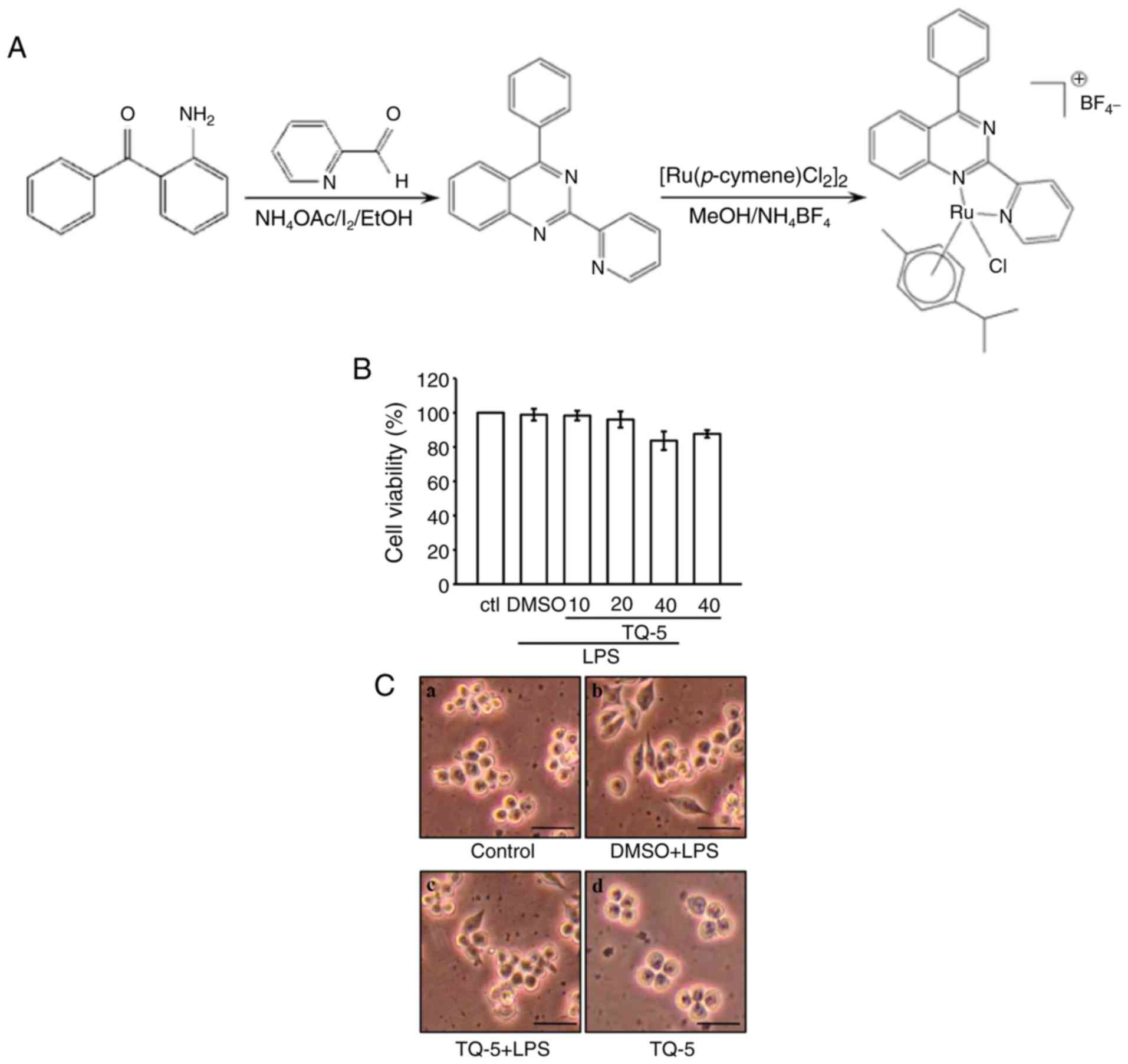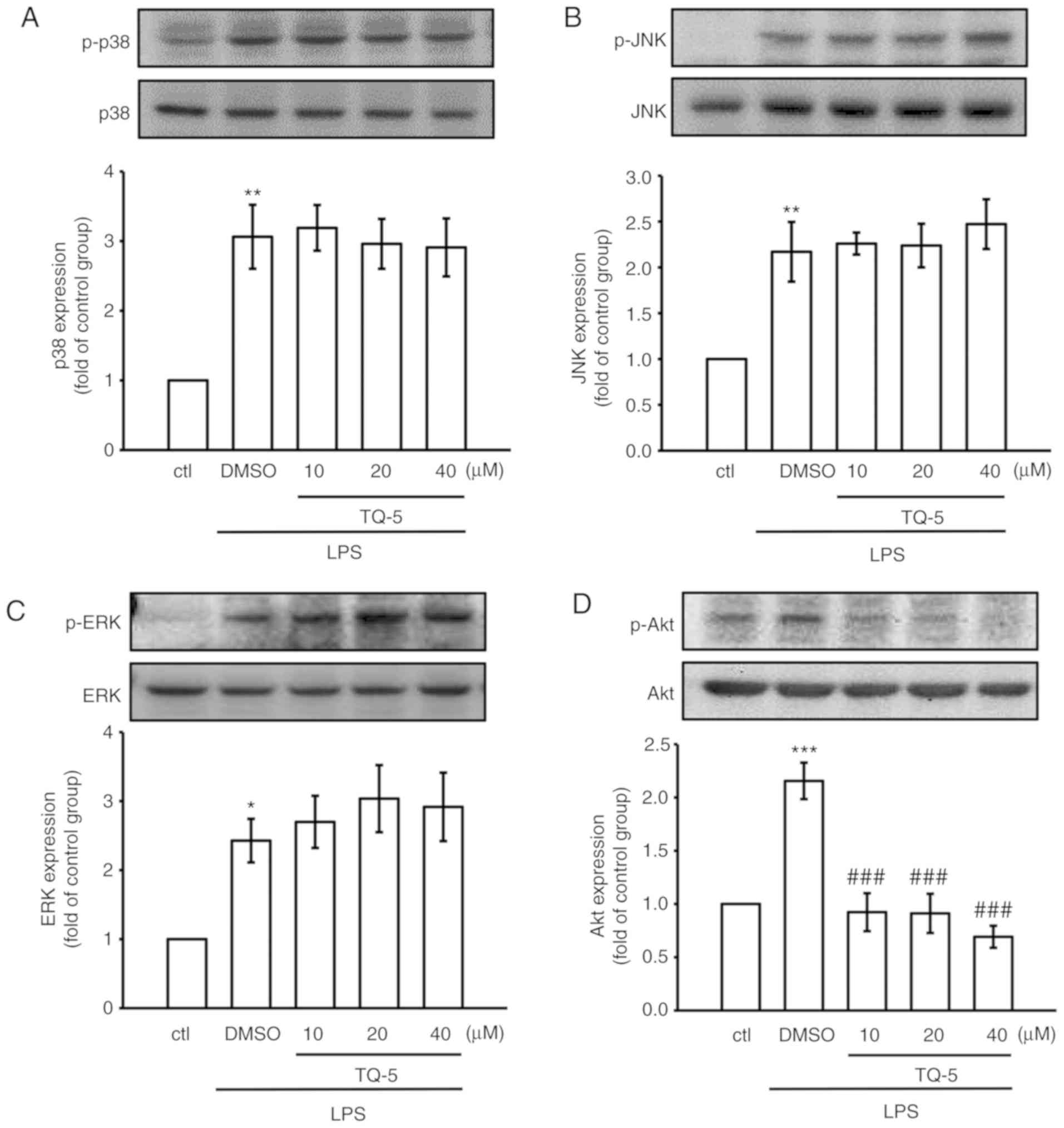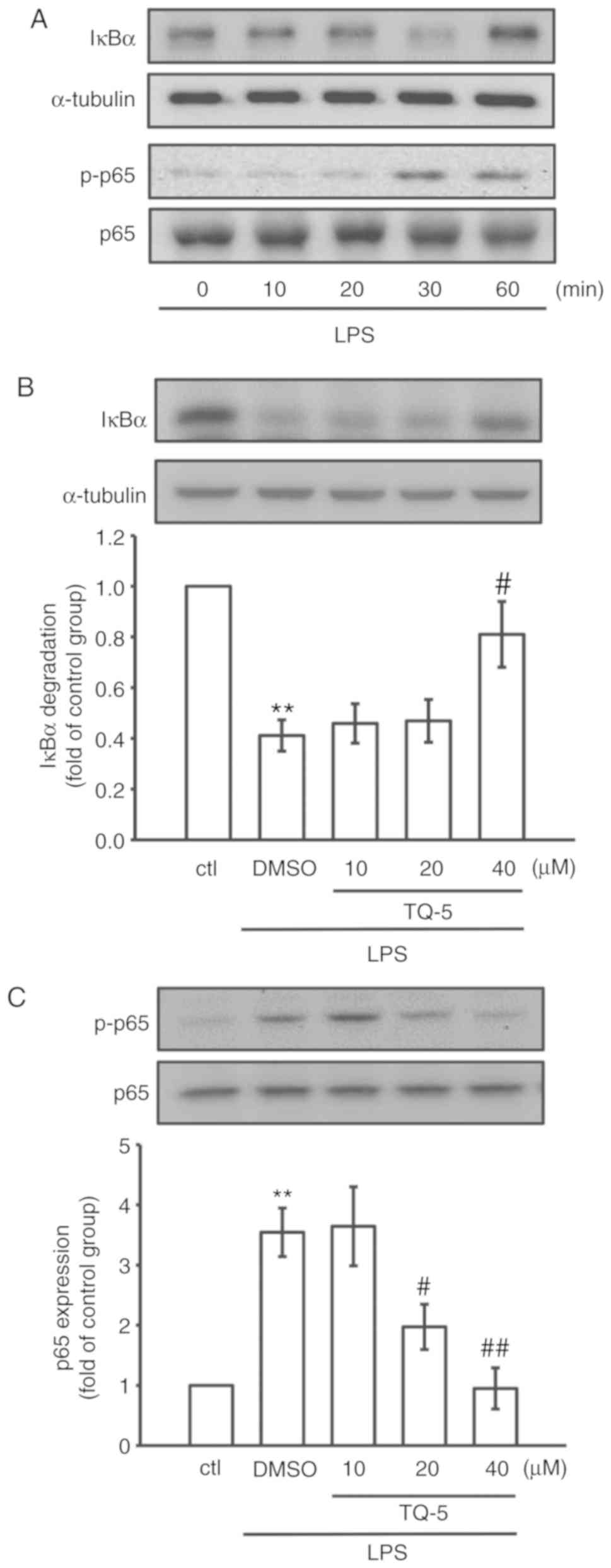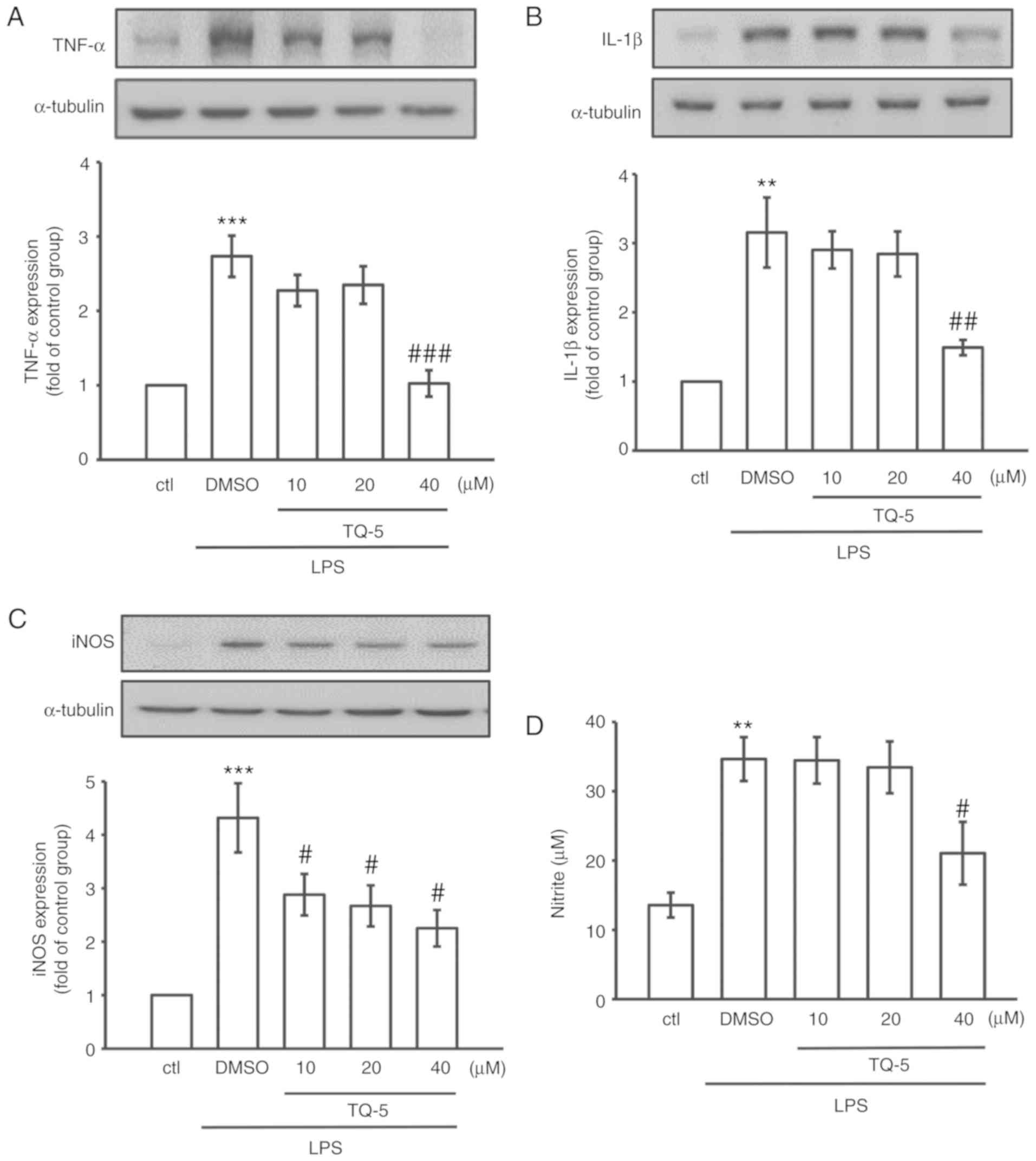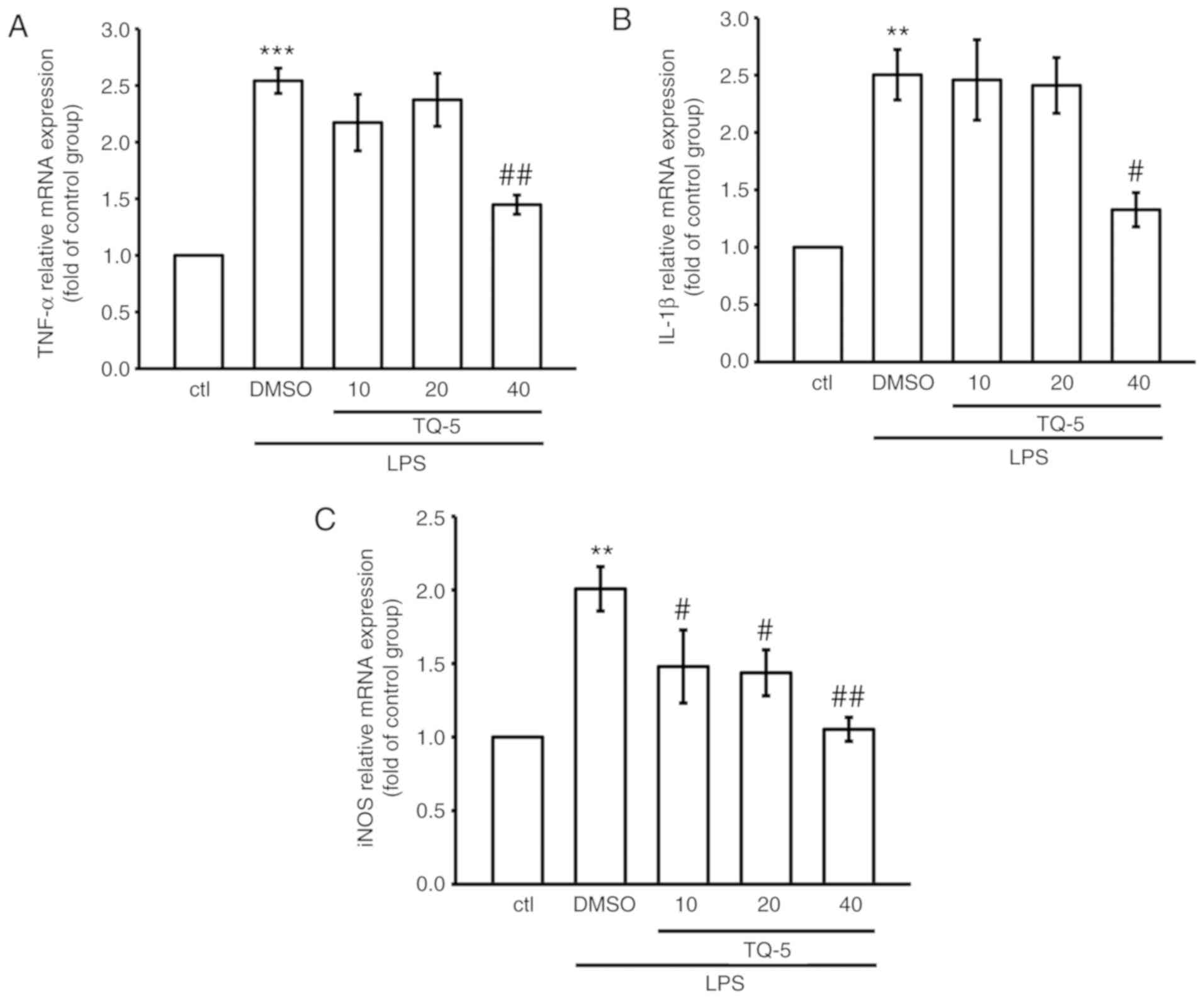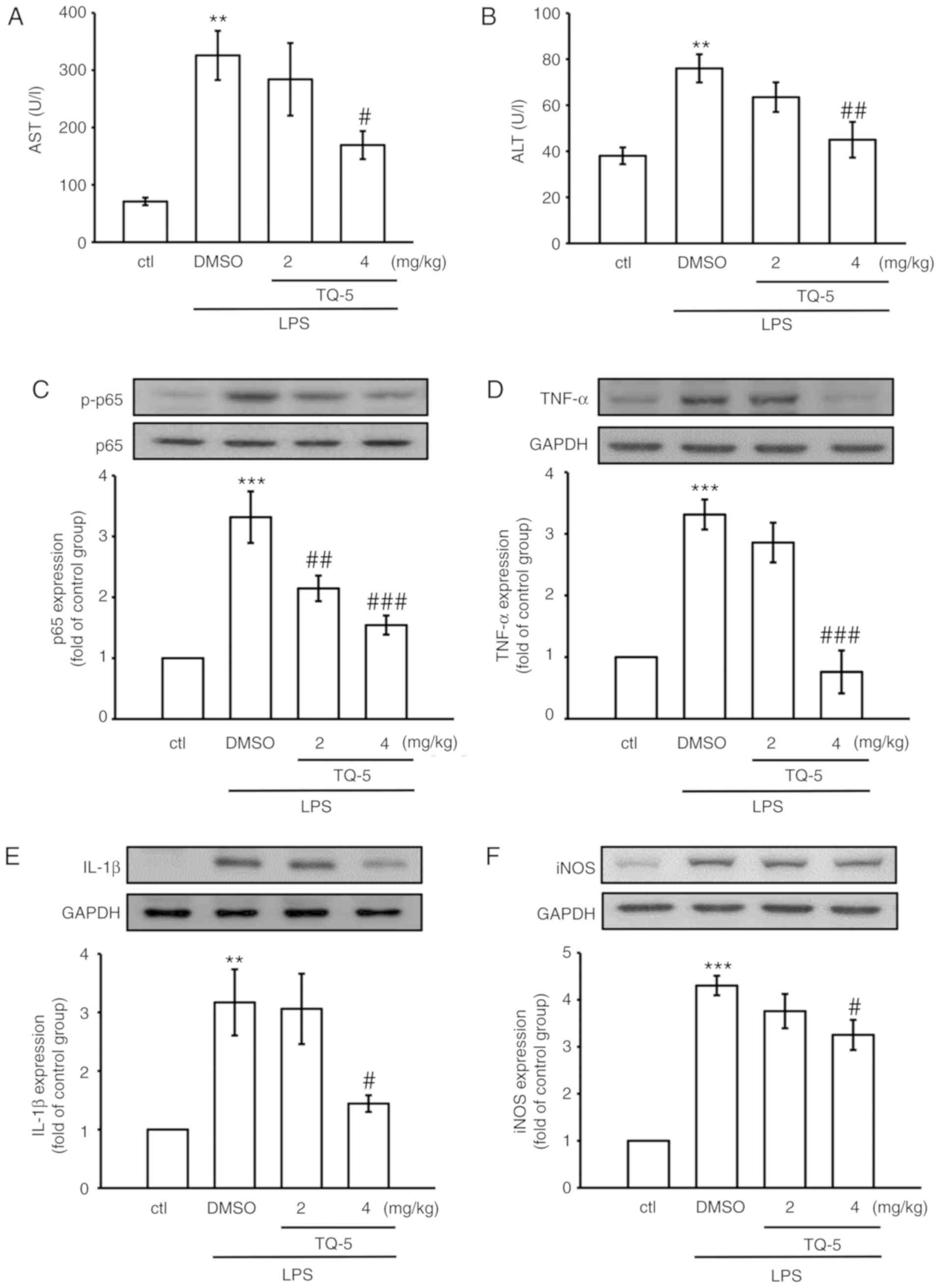|
1
|
Denker SP, Ji S, Dingman A, Lee SY,
Derugin N, Wendland MF and Vexler ZS: Macrophages are comprised of
resident brain microglia not infiltrating peripheral monocytes
acutely after neonatal stroke. J Neurochem. 100:893–904. 2007.
View Article : Google Scholar : PubMed/NCBI
|
|
2
|
Kimbell B and Murray SA: What is the
patient experience in advanced liver disease? A scoping review of
the literature. BMJ Support Palliat Care. 5:471–480. 2015.
View Article : Google Scholar
|
|
3
|
Newland CD: Acute liver failure. Pediatr
Ann. 45:e433–e438. 2016. View Article : Google Scholar : PubMed/NCBI
|
|
4
|
Kuroda N, Inoue K, Ikeda T, Hara Y, Wake K
and Sato T: Apoptotic response through a high mobility box 1
protein-dependent mechanism in LPS/GalN-induced mouse liver failure
and glycyrrhizin-mediated inhibition. PLoS One. 9:e928842014.
View Article : Google Scholar : PubMed/NCBI
|
|
5
|
Moratalla A, Caparrós E, Juanola O,
Portune K, Puig-Kröger A, Estrada-Capetillo L, Bellot P,
Gómez-Hurtado I, Piñero P, Zapater P, et al: Bifidobacterium
pseudocatenulatum CECT7765 induces an M2 anti-inflammatory
transition in macrophages from patients with cirrhosis. J Hepatol.
64:135–145. 2016. View Article : Google Scholar
|
|
6
|
Jeong YH, Oh YC, Cho WK, Shin H, Lee KY
and Ma JY: Anti-inflammatory effects of Viola yedoensis and the
application of cell extraction methods for investigating bioactive
constituents in macrophages. BMC Complement Altern Med. 16:1802016.
View Article : Google Scholar : PubMed/NCBI
|
|
7
|
Dumitru CD, Ceci JD, Tsatsanis C,
Kontoyiannis D, Stamatakis K, Lin JH, Patriotis C, Jenkins NA,
Copeland NG, Kollias G and Tsichlis PN: TNF-alpha induction by LPS
is regulated posttranscriptionally via a Tpl2/ERK-dependent
pathway. Cell. 103:1071–1083. 2000. View Article : Google Scholar
|
|
8
|
Ho FM, Lai CC, Huang LJ, Kuo TC, Chao CM
and Lin WW: The anti-inflammatory carbazole, LCY-2-CHO, inhibits
lipopolysaccharide-induced inflammatory mediator expression through
inhibition of the p38 mitogen-activated protein kinase signaling
pathway in macrophages. Br J Pharmacol. 141:1037–1047. 2004.
View Article : Google Scholar : PubMed/NCBI
|
|
9
|
Klintman D, Li X, Santen S, Schramm R,
Jeppsson B and Thorlacius H: p38 mitogen-activated protein
kinase-dependent chemokine production, leukocyte recruitment, and
hepatocellular apoptosis in endotoxemic liver injury. Ann Surg.
242:830–838. 2005. View Article : Google Scholar : PubMed/NCBI
|
|
10
|
Bennett BL, Sasaki DT, Murray BW, O'Leary
EC, Sakata ST, Xu W, Leisten JC, Motiwala A, Peirce S, Satoh Y, et
al: SP600125, an anthrapyrazolone inhibitor of Jun N-terminal
kinase. Proc Natl Acad Sci USA. 98:13681–13686. 2001. View Article : Google Scholar : PubMed/NCBI
|
|
11
|
DiDonato JA, Mercurio F and Karin M:
Phosphorylation of I kappa B alpha precedes but is not sufficient
for its dissociation from NF-kappa B. Mol Cell Biol. 15:1302–1311.
1995. View Article : Google Scholar : PubMed/NCBI
|
|
12
|
Tak PP and Firestein GS: NF-kappaB: A key
role in inflammatory diseases. J Clin Invest. 107:7–11. 2001.
View Article : Google Scholar : PubMed/NCBI
|
|
13
|
Cantley LC: The phosphoinositide 3-kinase
pathway. Science. 296:1655–1657. 2002. View Article : Google Scholar : PubMed/NCBI
|
|
14
|
Guha M and Mackman N: The
phosphatidylinositol 3-kinase-Akt pathway limits lipopolysaccharide
activation of signaling pathways and expression of inflammatory
mediators in human monocytic cells. J Biol Chem. 277:32124–32132.
2002. View Article : Google Scholar : PubMed/NCBI
|
|
15
|
Basri AM, Lord RM, Allison SJ,
Rodríguez-Bárzano A, Lucas SJ, Janeway FD, Shepherd HJ, Pask CM,
Philips RM and McGowan PC: Bis-picolinamide Ruthenium (III)
dihalide complexes: Dichloride-to-diiodide exchange generates
single trans isomers with high potency and cancer cell selectivity.
Chemistry. 23:6341–6356. 2017. View Article : Google Scholar : PubMed/NCBI
|
|
16
|
Saeed HK, Saeed IQ, Buurma NJ and Thomas
JA: The structure of linkers affects the DNA binding properties of
tethered dinuclear Ruthenium (II) metallo-intercalators. Chemistry.
23:5467–5477. 2017. View Article : Google Scholar : PubMed/NCBI
|
|
17
|
Faller P and Hureau C: A bioinorganic view
of Alzheimer's disease: When misplaced metal ions (re)direct the
electrons to the wrong target. Chemistry. 18:15910–15920. 2012.
View Article : Google Scholar : PubMed/NCBI
|
|
18
|
Hsia CH, Velusamy M, Sheu JR, Khamrang T,
Jayakumar T, Lu WJ, Lin KH and Chang CC: A novel ruthenium
(II)-derived organometallic compound, TQ-6, potently inhibits
platelet aggregation: Ex vivo and in vivo studies. Sci Rep.
7:95562017. View Article : Google Scholar : PubMed/NCBI
|
|
19
|
Jayakumar T, Hsu CY, Khamrang T, Hsia CH,
Hsia CW, Manubolu M and Sheu JR: Possible molecular targets of
novel ruthenium complexes in antiplatelet therapy. Int J Mol Sci.
19:E18182018. View Article : Google Scholar : PubMed/NCBI
|
|
20
|
Huang BP, Lin CH, Chen HM, Lin JT, Cheng
YF and Kao SH: AMPK activation inhibits expression of
proinflammatory mediators through downregulation of PI3K/p38 MAPK
and NF-κB signaling in murine macrophages. DNA Cell Biol.
34:133–141. 2015. View Article : Google Scholar
|
|
21
|
Livak KJ and Schmittgen TD: Analysis of
relative gene expression data using real-time quantitative PCR and
the 2(-Delta Delta C(T)) method. Methods. 25:402–408. 2001.
View Article : Google Scholar
|
|
22
|
Jung JS, Choi MJ, Lee YY, Moon BI, Park JS
and Kim HS: Suppression of lipopolysaccharide-induced
neuroinflammation by morin via MAPK, PI3K/Akt, and PKA/HO-1
signaling pathway modulation. J Agric Food Chem. 65:373–382. 2017.
View Article : Google Scholar
|
|
23
|
Jing Y, Ai Q, Lin L, Dai J, Jia M, Zhou D,
Che Q, Wan J, Jiang R and Zhang L: Protective effects of garcinol
in mice with lipopolysaccharide/D-galactosamine-induced apoptotic
liver injury. Int Immunopharmacol. 19:373–380. 2014. View Article : Google Scholar : PubMed/NCBI
|
|
24
|
Fan GW, Zhang Y, Jiang X, Zhu Y, Wang B,
Su L, Cao W, Zhang H and Gao X: Anti-inflammatory activity of
baicalein in LPS-stimulated RAW264.7 macrophages via estrogen
receptor and NF-κB-dependent pathways. Inflammation. 36:1584–1591.
2013. View Article : Google Scholar : PubMed/NCBI
|
|
25
|
Hartley JW, Evans LH, Green KY, Naghashfar
Z, Macias AR, Zerfas PM and Ward JM: Expression of infectious
murine leukemia viruses by RAW264.7 cells, a potential complication
for studies with a widely used mouse macrophage cell line.
Retrovirology. 5:12008. View Article : Google Scholar : PubMed/NCBI
|
|
26
|
Peng XX, Zhang SH, Wang XL, Ye TJ, Li H,
Yan XF, Wei L, Wu ZP, Hu J, Zou CP, et al: Panax Notoginseng flower
saponins (PNFS) inhibit LPS-stimulated NO overproduction and iNOS
gene overexpression via the suppression of TLR4-mediated
MAPK/NF-kappa B signaling pathways in RAW264.7 macrophages. Chin
Med. 10:152015. View Article : Google Scholar : PubMed/NCBI
|
|
27
|
Pan MH, Chiou YS, Tsai ML and Ho CT:
Anti-inflammatory activity of traditional Chinese medicinal herbs.
J Tradit Complement Med. 1:8–24. 2011. View Article : Google Scholar : PubMed/NCBI
|
|
28
|
Han S, Lee JH, Kim C, Nam D, Chung WS, Lee
SG and Ahn KS, Cho SK, Cho M and Ahn KS: Capillarisin inhibits
iNOS, COX-2 expression, and proinflammatory cytokines in
LPS-induced RAW 264.7 macrophages via the suppression of ERK, JNK,
and NF-κB activation. Immunopharmacol Immunotoxicol. 35:34–42.
2013. View Article : Google Scholar
|
|
29
|
Chang CF, Liao KC and Chen CH:
2-Phenylnaphthalene derivatives inhibit lipopolysaccharide-induced
pro-inflammatory mediators by downregulating of MAPK/NF-κB pathways
in RAW 264.7 macrophage cells. PLoS One. 12:e01689452017.
View Article : Google Scholar
|
|
30
|
Hämäläinen M, Nieminen R, Vuorela P,
Heinonen M and Moilanen E: Anti-inflammatory effects of flavonoids:
Genistein, kaempferol, quercetin, and daidzein inhibit STAT-1 and
NF-kappaB activations, whereas flavone, isorhamnetin, naringenin,
and pelargonidin inhibit only NF-kappaB activation along with their
inhibitory effect on iNOS expression and NO production in activated
macrophages. Mediators Inflamm. 2007:456732007. View Article : Google Scholar
|
|
31
|
Liu LJ, Lin S, Chan DS, Vong CT, Hoi PM,
Wong CY, Ma DL and Leung CH: A rhodium (III) complex inhibits
LPS-induced nitric oxide production and angiogenic activity in
cellulo. J Inorg Biochem. 140:23–28. 2014. View Article : Google Scholar : PubMed/NCBI
|
|
32
|
Leung CH, Lin S, Zhong HJ and Ma DL: Metal
complexes as potential modulators of inflammatory and autoimmune
responses. Chem Sci. 6:871–884. 2015. View Article : Google Scholar : PubMed/NCBI
|
|
33
|
Chang CF, Chau YP, Kung HN and Lu KS: The
lipopolysaccharide-induced pro-inflammatory response in RAW264.7
cells is attenuated by an unsaturated fatty acid-bovine serum
albumin complex and enhanced by a saturated fatty acid-bovine serum
albumin complex. Inflamm Res. 61:151–160. 2012. View Article : Google Scholar
|
|
34
|
Ji G, Zhang Y, Yang Q, Cheng S, Hao J,
Zhao X and Jiang Z: Genistein suppresses LPS-induced inflammatory
response through inhibiting NF-κB following AMP kinase activation
in RAW 264.7 macrophages. PLoS One. 7:e531012012. View Article : Google Scholar
|
|
35
|
Satake H, Suzuki K, Aoki T, Otsuka M,
Sugiura Y, Yamamoto T and Inoue J: Cupric ion blocks NF-kappa B
activation through inhibiting the signal-induced phosphorylation of
I kappa B alpha. Biochem Biophys Res Commun. 216:568–573. 1995.
View Article : Google Scholar : PubMed/NCBI
|
|
36
|
Jeon KI, Jeong JY and Jue DM:
Thiol-reactive metal compounds inhibit NF-kappa B activation by
blocking I kappa B kinase. J Immunol. 164:5981–5989. 2000.
View Article : Google Scholar : PubMed/NCBI
|
|
37
|
Kaminska B: MAPK signalling pathways as
molecular targets for anti-inflammatory therapy-from molecular
mechanisms to therapeutic benefits. Biochim Biophys Acta.
1754:253–262. 2005. View Article : Google Scholar : PubMed/NCBI
|
|
38
|
Zong Y, Sun L, Liu B, Deng YS, Zhan D,
Chen YL, He Y, Liu J, Zhang ZJ, Sun J and Lu D: Resveratrol
inhibits LPS-induced MAPKs activation via activation of the
phosphatidylinositol 3-kinase pathway in murine RAW 264.7
macrophage cells. PLoS One. 7:e441072012. View Article : Google Scholar : PubMed/NCBI
|
|
39
|
Wang Z, Jiang W, Zhang Z, Qian M and Du B:
Nitidine chloride inhibits LPS-induced inflammatory cytokines
production via MAPK and NF-kappaB pathway in RAW 264.7 cells. J
Ethnopharmacol. 144:145–150. 2012. View Article : Google Scholar : PubMed/NCBI
|
|
40
|
Intayoung P, Limtrakul P and Yodkeeree S:
Antiinflammatory activities of crebanine by inhibition of NF κB and
AP-1 activation through suppressing MAPKs and Akt signaling in
LPS-induced RAW264.7 macrophages. Biol Pharm Bull. 39:54–61. 2016.
View Article : Google Scholar
|
|
41
|
Hou W, Hu S, Su Z, Wang Q, Meng G, Guo T,
Zhang J and Ga P: Myricetin attenuates LPS-induced inflammation in
RAW 264.7 macrophages and mouse models. Future Med Chem.
10:2253–2264. 2018. View Article : Google Scholar : PubMed/NCBI
|
|
42
|
Karin M: Nuclear factor-kappa B in cancer
development and progression. Nature. 441:431–436. 2006. View Article : Google Scholar : PubMed/NCBI
|
|
43
|
Chen F, Castranova V, Shi X and Demers LM:
New insights into the role of nuclear factor-kappaB, a ubiquitous
transcription factor in the initiation of diseases. Clin Chem.
45:7–17. 1999.PubMed/NCBI
|
|
44
|
Colletti LM and Green M: Lung and liver
injury following hepatic ischemia/reperfusion in the rat is
increased by exogenous lipopolysaccharide which also increases
hepatic TNF production in vivo and in vitro. Shock. 16:312–319.
2001. View Article : Google Scholar : PubMed/NCBI
|
|
45
|
Sheu JR, Chen ZC, Hsu MJ, Wang SH, Jung
KW, Wu WF, Pan SH, Teng RD, Yang CH and Hsieh CY: CME-1, a novel
polysaccharide, suppresses iNOS expression in
lipopolysaccharide-stimulated macrophages through
ceramide-initiated protein phosphatase 2A activation. J Cell Mol
Med. 22:999–1013. 2018.
|















